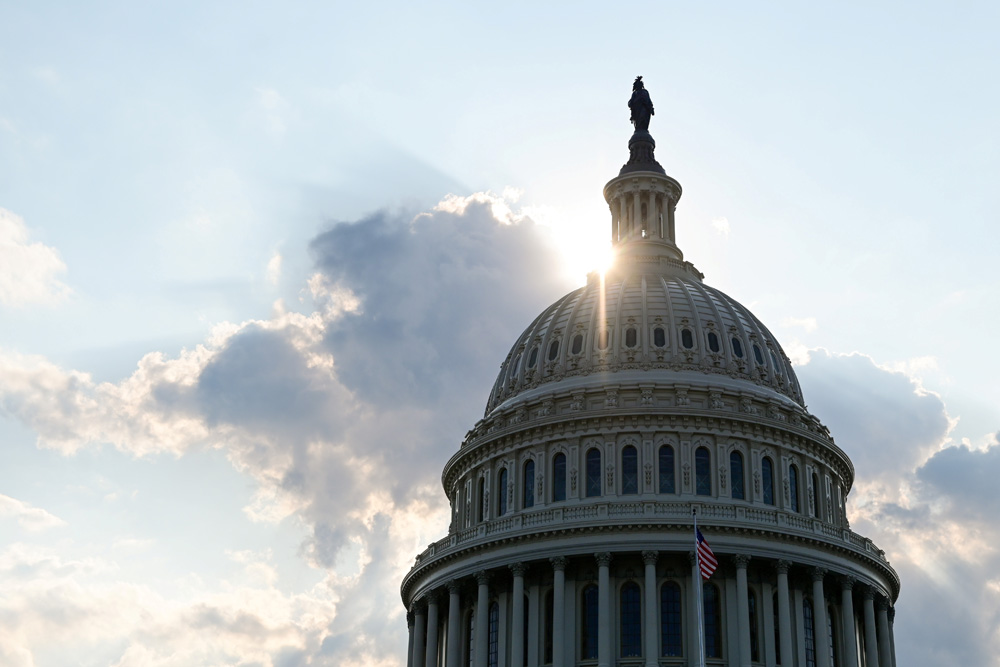
The dome of the U.S. Capitol is seen as the sun sets July 26 on Capitol Hill in Washington. (CNS/Erin Scott, Reuters)
President Donald Trump's incessant repetition of the word "perfect" to describe his phone call with Ukraine President Volodymyr Zelensky might, at first glance, appear a minor irritant, a narcissist's tic. More likely, however, it is a marketer's ploy, an example of how quickly the huckster is able to render language useless.
How is a phone call perfect?
Of course, it's utter nonsense as a description. But perfect, repeated often enough about anything, conveys that something good is afoot and something good is, well, good.
And when perfect is mixed in with the rest of his word salad about Ukraine and all of it is caught up in the swirl of headlines about the White House refusing to cooperate with a congressional inquiry; about State Department officials who feel their boss is compromised; or about Trump who, in an another ad hoc bit of foreign policy, decides to abandon an ally and open the Kurds in Syria to an onslaught from Turkey, one sees how the marketer might succeed. Who can sort it all out? Make sense of it? And somewhere in the dim past is that puny, if understandable, point of reference: perfect.
It is saying something about how far down an unrecognizable track the republic has traveled when "Orwellian" has lost any pungency it might once have delivered. The word works when what is Orwellian is so different from the norm that we understand the distortion described. But Orwellian today exhausts itself from overuse. The United States has entered a new norm. The question, relevant since the first days of the Trump administration and increasingly important with each passing month, is: "Can the institutions hold?"
It has taken far more than Trump to arrive at this point, where every corner of the public weal is charged with lethal levels of partisan voltage.
But Trump was there at the right moment, understood the way to exploit political and social divisions. Central to that effort was his dismissal of norms and disdain for public service and the institutions of democratic governance.
That disdain was evident in the language of the call to Zelensky, memorialized in a transcript, in a whistleblower's account, in the understanding of a growing number of unnamed government officials. Whether those words, seeking "a favor" and soliciting the help of a foreign government to smear a political opponent, are able to resist being rendered useless could be the key to our future.
We are a nation that came into existence by way of words in documents that are experiencing some of the most strenuous tests in our history.
Can the White House simply refuse to cooperate with the constitutionally granted investigative powers of a coequal branch of government?
Who throws the flag and enforces the penalty when the attorney general advocates for the political interests of the president?
Who puts the brakes on Rudolph Giuliani, globetrotting as the president's personal attorney, seeking foreign advocates to spread wild theories that undermine the conclusions reached by months of research by special prosecutor Robert Mueller and some of the country's finest legal minds?
Who tells Secretary of State Mike Pompeo that undermining professionals in his own department can have dangerous consequences not just for morale at home, but for our relationships and standing in the rest of the world?
Advertisement
There is evidence that the public is wearying of Trump's brand of governance. Polls are showing that increasing numbers of Americans are in favor of the House impeachment investigation with a surprising number in favor of removal of the president from office.
But reaching for a quick and definitive solution because of weariness may not serve the truth, and that is a far greater concern at the moment. It is easy to forget that the administration has been successful so far in delaying the release of stashes of documents, including grand jury testimony, that was central to the Mueller report.
While that report is seen as ineffective as a tool leading to impeachment because of its complexity, it could prove the far more important record of the degree to which Trump was willing to undermine the fundamentals of the justice system. Recall Mueller's chilling words as the task of determining the truth moved from his purview to Congress: "If we had had confidence that the president clearly did not commit a crime, we would have said so."
Keeping track of the unending flood of new turns and twists, of breaches of ethics and norms by this administration is an enormous challenge. It makes unusual demands not only on our time but on the very idea of citizenship.
It ultimately, however, is a citizen's obligation to press elected representatives to pursue the truth, to let them know — easy as a phone call or an email to readily available addresses and numbers — that despite all the clatter, we understand there are important principles that must be preserved and that deserve our focus.
Our founding documents are worth the effort. Not all of their words are perfect, but they're the best hope we've got.







